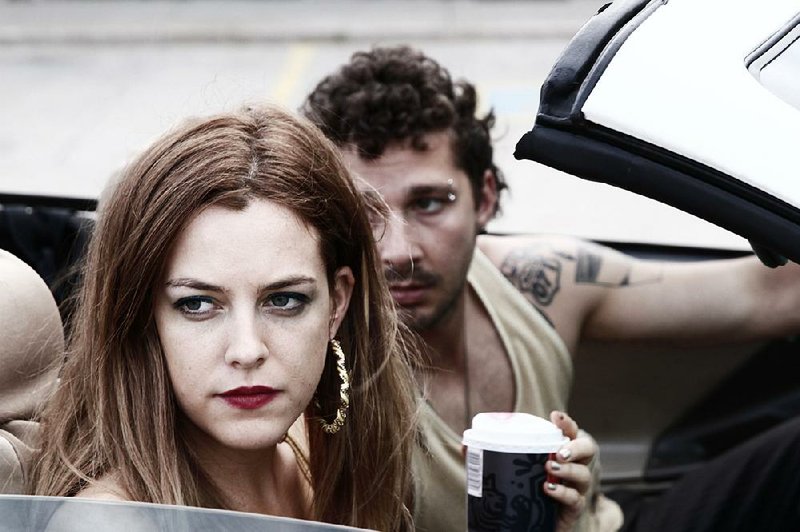In Death of a Salesman, Arthur Miller used the defeat of a door-to-door peddler to shatter the defining myth of a country where opportunity, material gain and personal fulfillment are there for the taking. But it's doubtful the playwright could ever have imagined the traveling sales crew in American Honey, a mob of teenage drifters suspended between emptiness and defiant resilience, selling something no one wants.
British writer-director Andrea Arnold's first U.S. feature is an immersive road movie that's bound to be divisive -- some will embrace it as an audacious free-form subculture odyssey, laced with moments of lyricism, while others will shrug at its baggy running time and paucity of narrative incident. Either way though, it's definitely something to be seen.
American Honey
87 Cast: Sasha Lane, Riley Keough, Shia LaBeouf, Raymond Coalson, Chad McKenzie Cox, Verronikah Ezell, Arielle Holmes, Garry Howell, Crystal B. Ice, McCaul Lombardi, Shawna Rae Moseley, Dakota Powers, Isaiah Stone, Kenneth Kory Tucker, Christopher David Wright
Director: Andrea Arnold
Rating: R, for strong sexual content, graphic nudity, language throughout, drug/alcohol abuse-all involving teens
Running time: Two hours, 43 minutes
The film evinces a kinship with the disaffected youth portraits of Gus Van Sant, like Elephant and Paranoid Park, and the darker brand of generational nihilism purveyed by Harmony Korine; its raw sexual content, wild energy and moments of reckless crime specifically recall Spring Breakers.
We learn very little about 18-year-old Star (luminous newcomer Sasha Lane) before she leaves behind her skeevy father, parks the two small half-siblings in her care with the mother who clearly doesn't want them and gets the hell out of Muskogee, Okla. Her exit package is a group of youths who go town-to-town, state-to-state in a van selling magazine subscriptions.
That might not seem the most promising avenue of escape, but Arnold makes it appear almost magical through Star's eyes, full of instant possibilities for romance and adventure. The group's top sales guy, Jake (Shia LaBeouf), first catches her eye, and then she looks on enchanted as they disturb the peace of a sleepy strip-mall supermarket, dancing to "We Found Love" (best use of a Rihanna song since Celine Sciamma's Girlhood).
The crew is managed by Krystal (Riley Keough, a tangy delight), a porn star manque with a rockin' body encased in a series of divinely trashy outfits by costumer Alex Bovaird. A money-minded mean girl with little time for pleasantries, Krystal sizes up Star with a mixture of sisterly approval and rivalrous suspicion that gets nastier as the new recruit's blossoming relationship with Jake starts hurting his sales figures.
That's pretty much it in terms of plot, and it's disappointing in a film of such unfettered structure and length that Arnold shows so little interest in exploring other connections within the group.
Only two characters stand out -- a gonzo surfer-dude type named Corey (McCaul Lombardi) and the sweetly unhinged Pagan (Arielle Holmes, from the Safdie Brothers' Heaven Knows What), who sleepwalks and obsesses about Star Wars. The sense of an anarchic, hard-partying surrogate family is clear as they swill vodka during 8 a.m. meetings or spark up a bowl in the van. But although they obviously care for one another, they remain a somewhat interchangeable bunch, a mass of background color swirling around Star.
Lane is certainly a magnetic screen presence, layering a hard edge of bruised experience behind the softness of her character's dreamy, hopeful gaze. And her chemistry is smoking with LaBeouf, who has found an ideal vehicle here to harness his edge-of-insanity unpredictability. But their tentative romance, and Star's justified concern as to how serious he is about her, never becomes a full-throttle dramatic engine.
Instead, the film works best as a poignant character study, observing Star as she settles into her independence and figures out who she wants to be, framed by a vast physical landscape that stretches socioeconomically from privileged wealth to squalid poverty. There's a wonderful intimacy in the way Arnold examines young women in her films. That's true here of scenes like one with an oilfield worker who pays Star $1,000 for some pretty miserable sex. Or another in which she makes a sales call on a dirt-poor house, and responds with empathy to the kids, all but abandoned by their junkie mother, with nothing in the refrigerator but a bottle of Mountain Dew.
Shot in the boxy Academy ratio with stinging clarity and richly sensual colors by Arnold's regular cinematographer Robbie Ryan, the movie hugs so closely to its central character that any distance between the filmmaker and her subject is erased. As with all of Arnold's films, the best of which arguably are her Oscar-winning 2003 short, Wasp, and her grimly beautiful 2009 feature, Fish Tank, there's not a trace of sentimentality, condescension or moralizing.
Much of the movie unfolds in confined spaces like the van, truck compartments or cheap motel rooms, but even open-air, walking-and-talking scenes are viewed through a tightly focused lens. Startling images of nature punctuate the film, providing an expressive motif that invites comparison to the work of Terrence Malick -- from bugs, birds and bees to dogs, cows and horses, a turtle, a sugar glider and a bear that clearly hasn't seen The Revenant.
The use of music is exhilarating throughout, from the rap and country-rock songs played in the van to Bruce Springsteen's "Dream Baby Dream," which becomes a shared wish during a warm encounter between Star and a kind family-man trucker. Particularly haunting use is made of Bonnie 'Prince' Billy's "Careless Love," while the Lady Antebellum song that gives the movie its title becomes a celebration of female freedom. And ultimately, despite its many somber reflections on the road from an uneasy past to an uncertain future, that's the chief takeaway from this rambling but unexpectedly penetrating film.
MovieStyle on 10/14/2016
